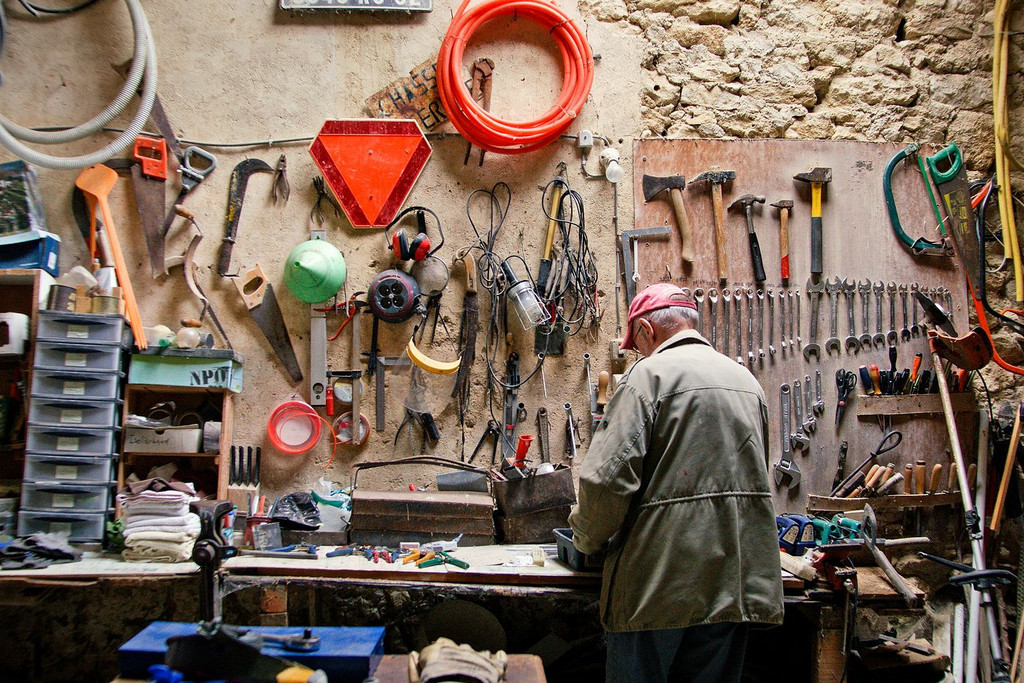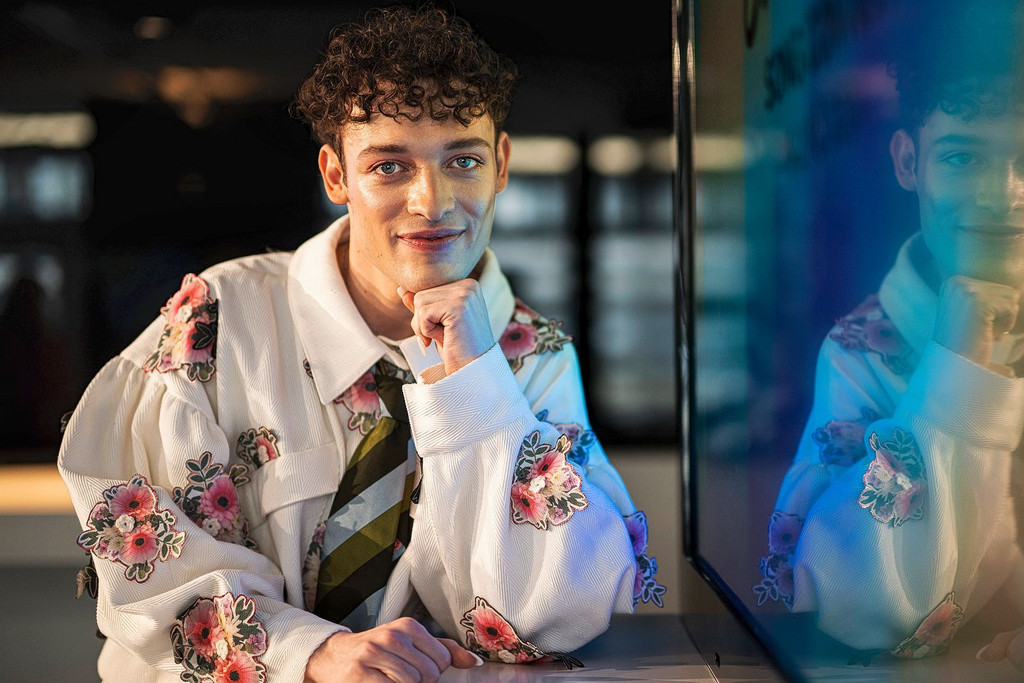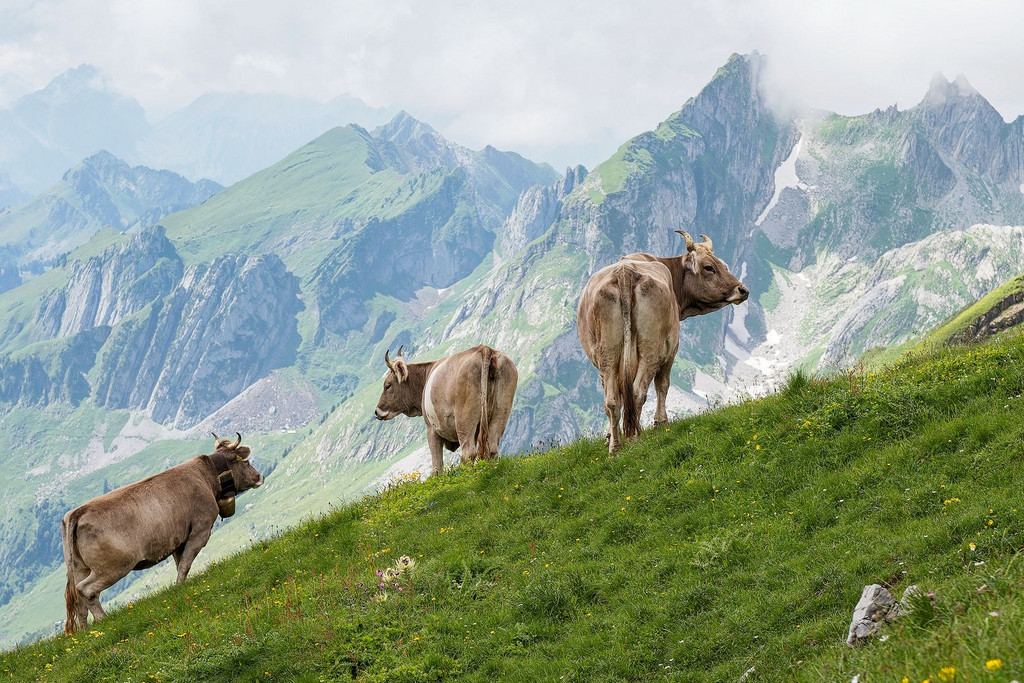
- Culture
Swiss rap is hip again in Geneva but poetic rather than political
22.01.2018 – Stéphane Herzog
The suburbs of Geneva have produced a group of young rappers whose lyrics are significant on an existential level. The group’s leading light, Makala, has now been signed by a major French label. The era of political criticism by rappers like Stress is over.
Last summer, a group of rappers from Geneva appeared on stage at the Frauenfeld rap festival alongside star names from America, like Gucci Mane and Nas. Their style of rap? A “flow” with occasional existential undertones. “Seeing local stars like Makala appear at this major festival was fantastic,” says Hadrien Mauron, an 18-year-old student from Geneva. A huge fan of American rap, who listens to two new albums a day, Mauron believes that Geneva’s Superwak Clique collective “are showing young people in French-speaking Switzerland that you can reach for the stars from humble beginnings”. The emergence of Makala, who is the driving force behind the group and has been signed by the major French label BMG, could also have been predicted. With his friends he has performed at venues in Paris, Marseilles, Brussels and London.
Malaka, Pink Flamingo, Di-Meh and Slimka for the younger fans, and also Williman, Basengo and the Valais-based rapper KT Gorique all represent this new rap movement from French-speaking Switzerland which is making waves on the international scene thanks to a style that is deemed accessible. “It’s not the socially conscious rap of the 1990s that refers to all the suffering that French hip-hop expresses, but a more lyrically sophisticated and personal form of rap,” explains Thibault Eigenmann, who co-founded the independent Colors record label with his partner Theo Lacroix. It produces the music of a number of the Superwak Clique artists. In Switzerland, people remember the rap music of Stress and Sens Unik, whose lyrics were extremely political at times.
Rap about reflective souls
One example of a sensitive track is “Piscine privée (Private Pool)” by Makala, in which the narrator explores his conscience. “Dans ma piscine privée, j’aime quand elle nage, j’suis là, j’la surveille, pour pas qu’elle se noie (In my private pool, I love it when she swims, I’m there watching her so she doesn’t drown)”, raps the young man with Congolese roots, who grew up in Les Avanchets in the suburbs of Geneva. On “Pink Flamingo”, a homage to a local producer of the same name, the rapper depicts a night-time scene. “La gue-dro (drogue) est aux commandes; les p’tits reufs (frères) sont mal guidés; les daronnes (mères) sont fatiguées; quand t’es dans ton lit, y’a des SDF habités; d’la farine dans les cavités. (Drugs rule, the brothers are misguided, their mothers are exhausted, when you’re in your bed, the homeless are housed and there’s powder in the cavities)”. Thibault Eigenmann, who does not believe that rap should be written down (and never provides the lyrics to tracks), is nevertheless willing to analyse them: “The track describes what happens at night. When Makala says the homeless are housed, it’s an oxymoron that expresses the notion that not everyone is necessarily on the road to ruin.”
Take control of your own life
Born in 1993 and having grown up in Onex, another suburb of Geneva, Williman encourages young people to create their own worlds. In his track “Genève, on dit quoi? (Geneva, What Do You Say?)”, the rapper depicts “ténèbres, où les gens courent à la lueur du diamant (a bleak world where people chase the sparkle of diamonds)”. You have to get by here on your own. “J’ai créé mon propre business dans ce bas monde. Aux armes, je pars en guerre, passez-moi l’arbalète. Dans les grandes surfaces on est mal vus, ouais mon pote Albanais, hier je faisais dans le vol, aujourd’hui je fais dans le vocal. Les classes supérieures me prennent de haut (I’ve set up my own business in this lowly world. Get your weapons, I’m going to war, pass me the crossbow. They don’t like us in the big stores, yes my Albanian friend, yesterday I was stealing, today I’m using my voice. The upper classes look down on me),” intones the artist from Geneva, whose mother comes from Cameroon, with anger. Basengo, who has Rwandan roots, is another artist who has been signed by Colors. “He calls on everyone to take control of their own life and not live a life devoid of meaning,” says Eigenmann. In “Ground Zero”, the rap artist describes a Geneva with empty bodies and a parade of carcasses. He warns his peers: “Fais gaffe. On investit dans ce qui est rentable seul assis à une trop grande taille. Et ton cœur tombe en panne, c’est le piège de l’opulence. A rester trop prudent le temps nous entaille (Watch out. They only invest in what’s profitable and on a large scale. Your heart’s worn out, it’s the trap of opulence. Keep safe, as time catches up with us).” The issue of cultural diversity is also tackled. The performer Aurélie Djee raps about “le loup, le renard, l’arbalète, le couscous et la fondue (the wolf, the fox, the crossbow, the couscous and the fondue)”. “A l’aise dans mes baskets j’ai pas de gri-gri (In my comfortable sneakers, I ain’t got no gris-gris)”, she tells us. The Valais-based Métis artist KT Gorique, who won the world rap freestyle championships in 2012 in New York, talks about rootlessness and racism “with even greater intensity, as being a foreigner in Valais is not necessarily easy”, points out the producer from Geneva. In “Vision nocturne (Night Vision)” she says: “J’arrête quelqu’un dans la rue, une fois sur deux, j’sens sa méfiance. La Suisse ne connait pas son histoire, s’en tape de celle des autres. Vote pour chasser l’immigrant sauf s’il transpire dans un maillot. J’habite en Valley, p’t’être que c’est l’endroit parfait pour en parler. Des guerres non déclarées entre villes, villages et mêmes quartiers. T’aimes pas ton voisin, dur d’accepter l’étranger. (I feel the distrust of every other person I stop in the street. Switzerland doesn’t know its own history and doesn’t give a damn about other people’s. They voted to get rid of immigrants unless they wear a football jersey. I live in the valley which is perhaps the ideal place to talk about it. Undeclared wars between towns, villages and even districts. If you don’t love your neighbours, it’s hard to accept foreigners)”.
A high number of foreigners
Does this wave of rap have any specifically Swiss traits? Thibault Eigenmann believes that it is the product of Geneva’s suburbs. He stresses that these estates do not experience the endemic problems and violence experienced by some French suburbs, which are described in French rap. However, he reveals that the families of the artists whose work he produces have sometimes had to fight to escape it. “Switzerland provides high-quality state education,” he says, before describing the distinctive environment of the suburbs, which have an extremely high number of foreigners. “Children whose parents speak a foreign language and who grow up in multicultural environments have slightly different language and express themselves in edgier ways. This may be because they are not sure what they are saying, so pronounce words more emphatically. I think that’s why young people from the estates are more likely to rap than those from more affluent parts of town”.
The lyrics penned by the Superwak Clique rappers sometimes borrow from clichés from American gangsta rap, but are not based on an ultra-violent reality. “The cover of Gun Love Fiction, Makala’s album released in 2017, shows a handgun pointed at someone’s head. It’s a violent image, but also a cinematographic depiction of violence, used to discuss our society’s ills and achievements,” states the co-founder of the Colors label. The fact that rap from French-speaking Switzerland is more objective means that it can be exported to France and other French-speaking countries. “These rappers are like big fish in a small pond,” says Hadrien Mauron, who occasionally bumps into artists from this scene at the McDonald’s on the corner.
The political rappers
French-speaking Switzerland has a history of political rap. For example, in 1993, Sens Unik, a band from Lausanne that was a key part of the emerging French hip-hop scene, shared its view of the nation in “L’île au trésor (Treasure Island)”: “Il existe une île au trésor. Un pays fantasmagorique qui n’est autre qu’un coffre fort. Où sont dissimulées des montagnes de pièces d’or coulées par des âmes sanguinaires dans les moules de la mort (There’s a treasure island. A fantasy land which is nothing but a vault. Where there are hidden mountains of gold coins cast by bloodthirsty souls in moulds of death)”. In 2003, Stress, a rapper from Lausanne, attacked the Swiss People’s Party in “Fuck Blocher”: “Ce pays si prospère a voté pour la peur. Comment un pays aussi multiculturel que la Suisse accepte au Conseil fédéral Blocher, ce raciste. Le blème, c’est que les jeunes ça les botte pas donc ils ne votent pas (This country that’s so wealthy voted for fear. How can a nation as multicultural as Switzerland elect this racist Blocher to the Federal Council. The problem is that young people don’t care, so they don’t vote)”.
Picture Makala is one of the new stars of the Swiss hip-hop scene. His rap is the product of Geneva’s suburbs. Photo: Keystone










Comments